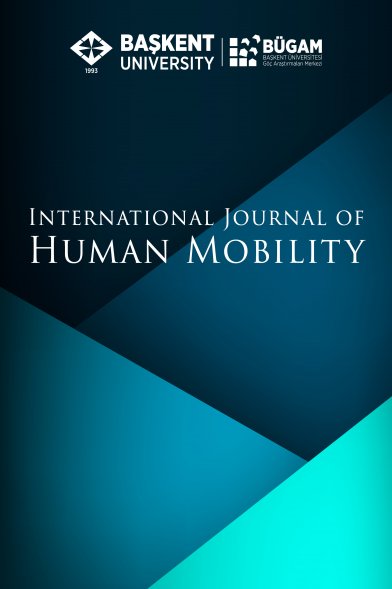Almanya’daki Türk Dernekleri ve Diyaspora Oluşturma Potansiyalleri: Duisburg-Essen Örneği
Almanya’da yaşayan ve ilk kez 1961 yılında imzalanan işçi anlaşması ile kitlesel olarak bu ülkeye göç eden toplam 3 milyon kadar Türk nüfus bulunmaktadır. Bu nüfus işçi olarak gittiyse de işçi olarak kalmadı, memur, işveren veya patron oldular. İlk gruptaki yüksek eğitimliler hariç, daha sonrakilerin çoğu eğitim düzeyi düşük işçilerden oluşmakta iken, bu düzey yıllar içinde tedricen yükseldi. Dil bilmeyen bu insanlar zamanla dil öğrendiler ve Almanya’da yüksek eğitim aldılar. Benzer bir şekilde bürokrasiyi bilmeyen bu insanlar zamanla bürokrasiyi tanıdı ve hak arama yollarını keşfettiler. En önemlisi, ilk yıllarda sadece Cami ve hemşerilik derneği kuran bu nüfus, son on yıllarda artık eğitim, meslek ve lobi dernekleri kurmaya başladılar. Özellikle son 20-30 yılda yavaş ama emin adımlarla bir diaspora oluşturmak üzere sağlam temeller atmaya başladılar. Bu çalışmada, Almanya’nın Duisburg ve Essen şehirlerinde faaliyet gösteren 58 Türk menşeli derneğin yöneticileri, üye ve gönüllüleri ile anket ve mülakat yapılarak 63 yılda yaşanan değişimin özellikle eğitim ve dil boyutu anlaşılmaya çalışılmış, yaşanan değişimin diasporaya hizmet etme derecesi test edilmiştir. Özellikle üçüncü kuşaktan itibaren bir diasporanın oluşmakta olduğu kanaatine varılmıştır.
Anahtar Kelimeler:
Almanya’daki Türkler, Duisburg ve Essen’deki Türk dernekleri, eğitim ve dil seviyesi, lobicilik, diaspora.
Turkish Associations in Germany and Diaspora Formation Potentials: The Case of Duisburg-Essen
In Germany, there is a total Turkish population of about 3 million, who migrated to the country massively for the first time with the labor agreement signed in 1961. While this population initially went as workers, they did not remain as workers; they became civil servants, employers, or entrepreneurs. While the first group mostly consisted of highly educated individuals, the majority of those who came later were low-educated workers, but this level gradually increased over the years. These individuals, who initially did not speak the language, learned the language over time and received higher education in Germany. Si milarly, those who initially did not understand the bureaucracy gradually became familiar with it and discovered ways to assert their rights. Most importantly, this population, who initially only established mosques and hometown associations, started to establish educational, professional, and lobbying associations in the last ten years. Especially in the last 20-30 years, they have begun to lay solid foundations to establish a diaspora, albeit slowly but steadily. In this study, conducted through surveys and interviews with the managers, members, and volunteers of 58 Turkish-origin associations operating in the cities of Duisburg and Essen in Germany, an attempt has been made to understand the changes that have occurred over 63 years, especially in terms of education and language, and to test the degree to which these changes serve the diaspora. It is particularly concluded that a diaspora is being formed, especially from the third generation onwards.
Keywords:
Turks in Germany, Turkish associations in Duisburg and Essen, the level of education and language, lobbying, diaspora,
- ISSN: E-ISSN | 2792-0461
- Başlangıç: 2021
- Yayıncı: Başkent Üniversitesi Göç Araştırmaları Merkezi
Sayıdaki Diğer Makaleler
Gündelik Hayatta Mülteci Kadınların Yaşadıkları Sorunlar Üzerine Bir İnceleme: Misafir Filmi Örneği
Türkiye’ye Yönelik Afganistan Kaynaklı Göçe İlişkin Sahadan Güncel Gözlemler
Teritoryal Tuzağa Karşı Bourdieu Sosyolojisi Çerçevesinde Ulusötesi Toplumsal Alanlar
Göçün Çocuklar Üzerindeki Etkisi: Bir Derleme Makalesi
Elif Demir , Beyhan Özge Yersel
Sekizinci Yılında Avrupa Birliği-Türkiye Mutabakatı: Dışsallaştırmadan Dijitalleşmeye
Almanya’daki Türk Dernekleri ve Diyaspora Oluşturma Potansiyalleri: Duisburg-Essen Örneği
